Sustainable comsumption trends in the european market and problems given to Vietnam’s agricultural product exports
European markets are shifting towards responsible consumption. More and more consumers
are reluctant to buy products which has special conditions such as their processes are harmful
to the environment, the workers have to work in bad conditions or any stages of the products
is illegal. Social and environmental responsibility in the production process is becoming
another criterion for Vietnam's export agricultural products. Therefore, it raises issues for
policymakers, civil society organizations and individuals about the importance of paying
attention to sustainable consumption in a long-term development strategy - a key point of
view comes from production for sustainable development.
Responsible production and consumption is one of 17 Global Goals that make up the 2030
Agenda for Sustainable Development of United Nations. Responsible and sustainable
development requires an urgent reduction in the ecological footprint by changing the way
goods and resources are produced and consumed. The sustainable consumption challenge
emerged as a key issue in 1992 at the United Nations Conference on Environment and
Development in Rio de Janeiro. Ten years later, at the World Summit on Sustainable
Development in Johannesburg, the international community was called upon to improve
global living conditions
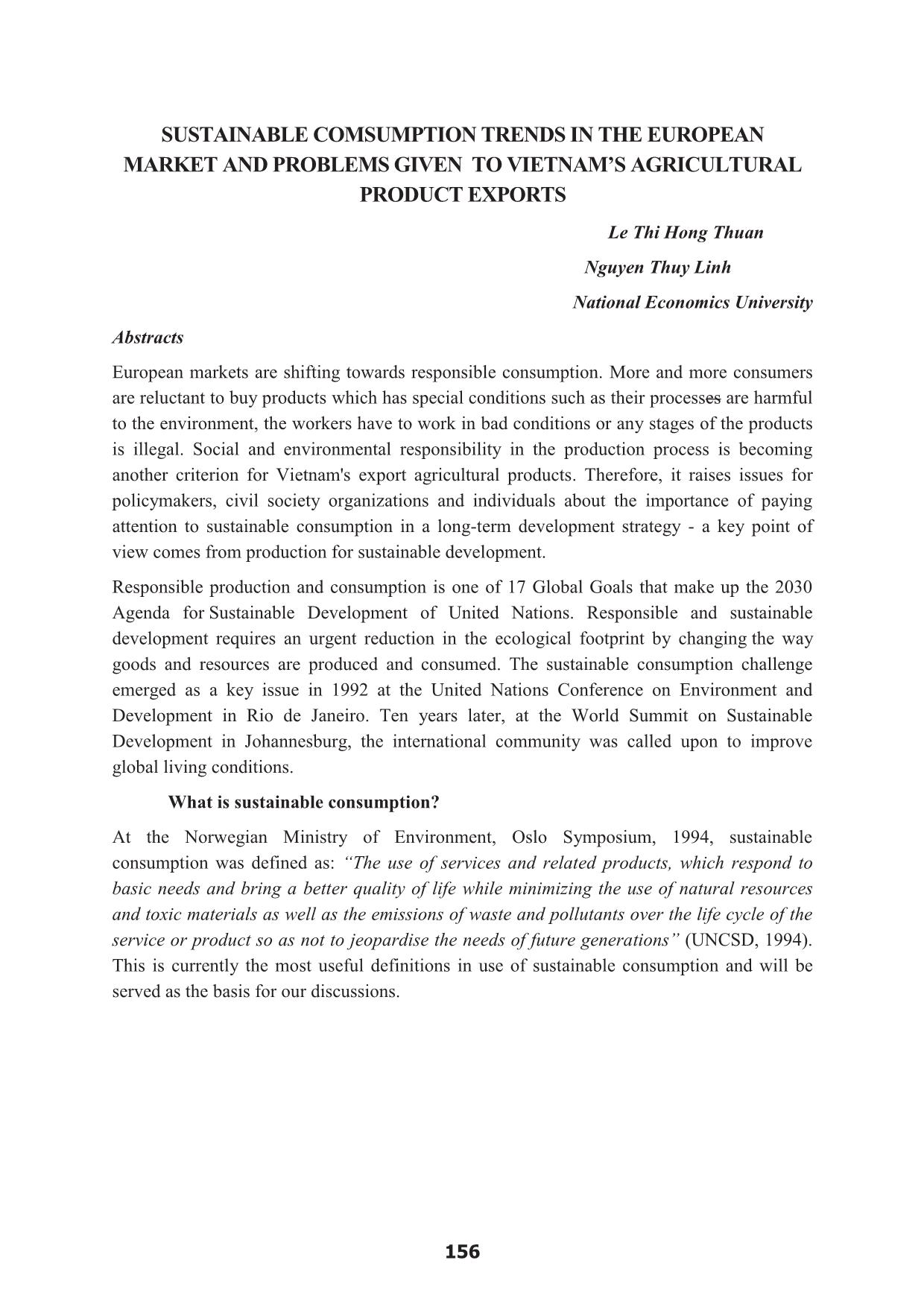
Trang 1
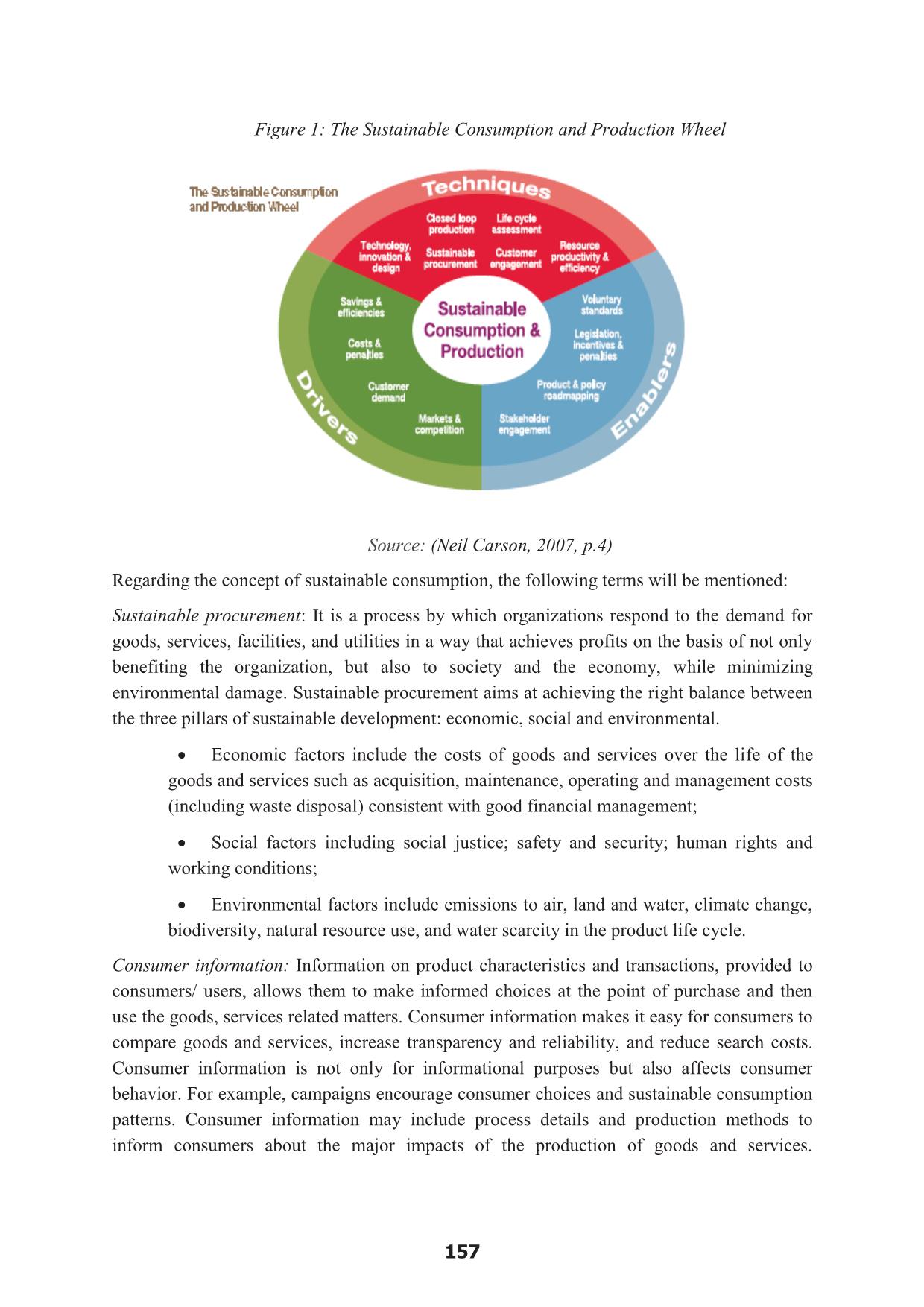
Trang 2
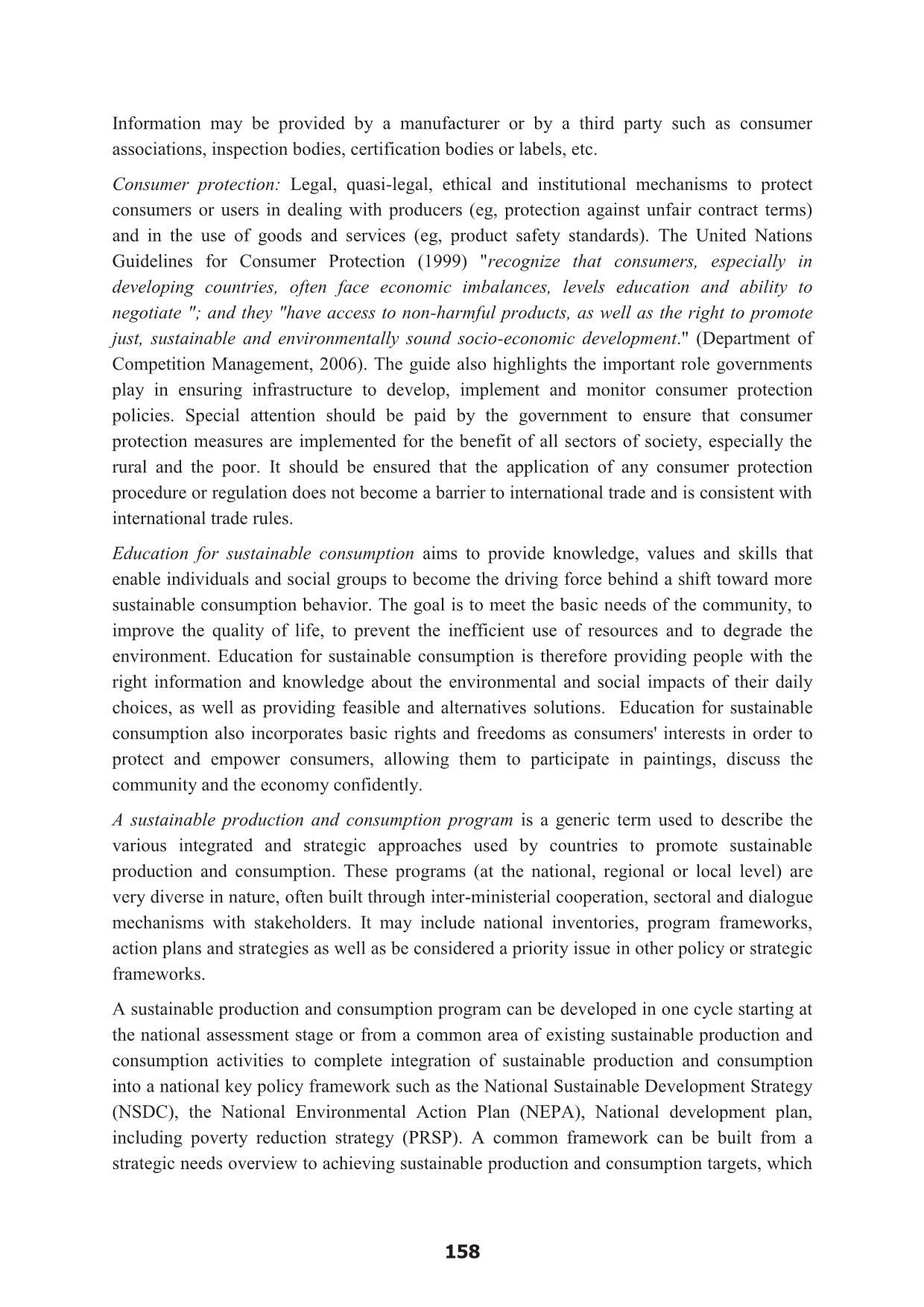
Trang 3
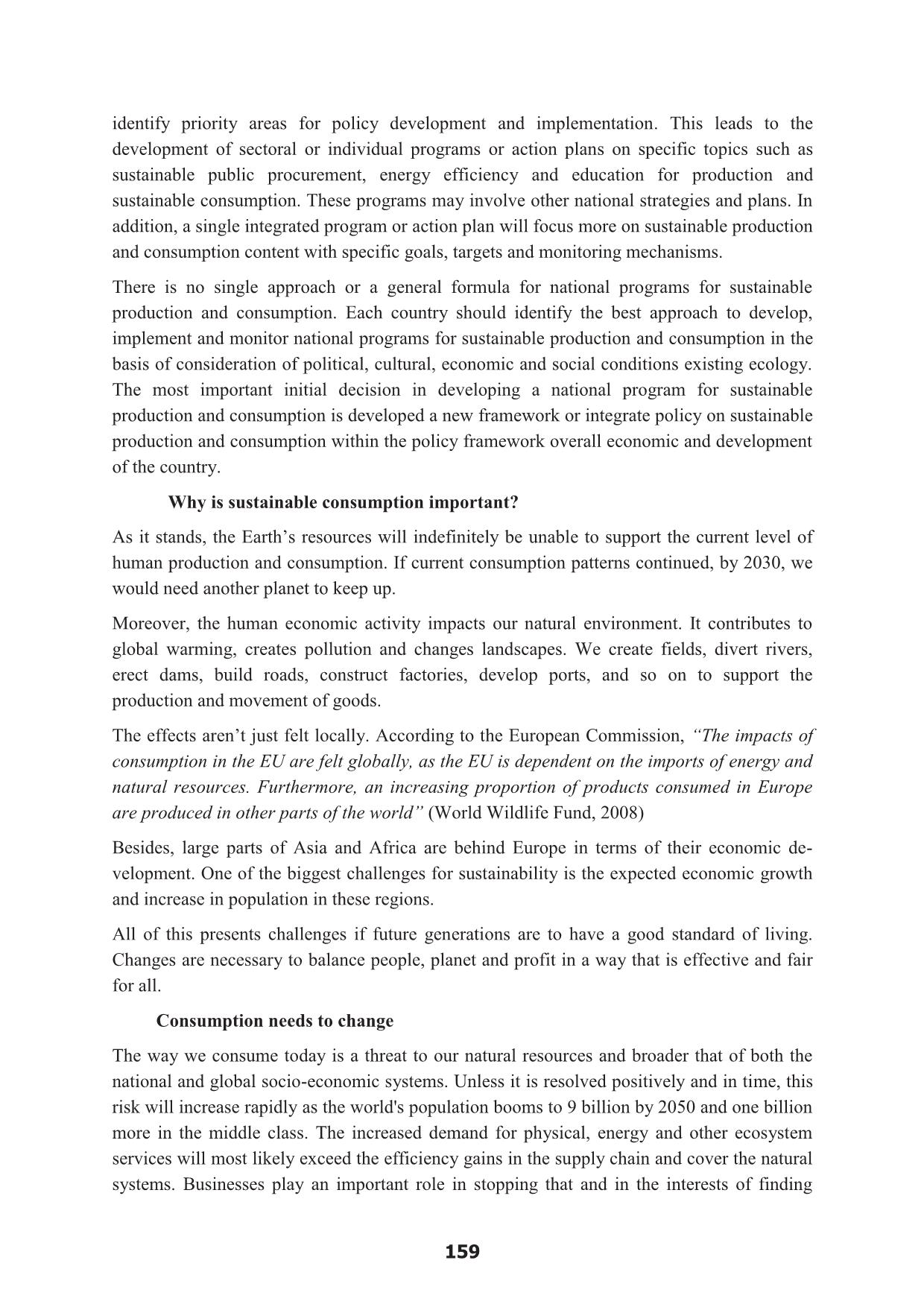
Trang 4
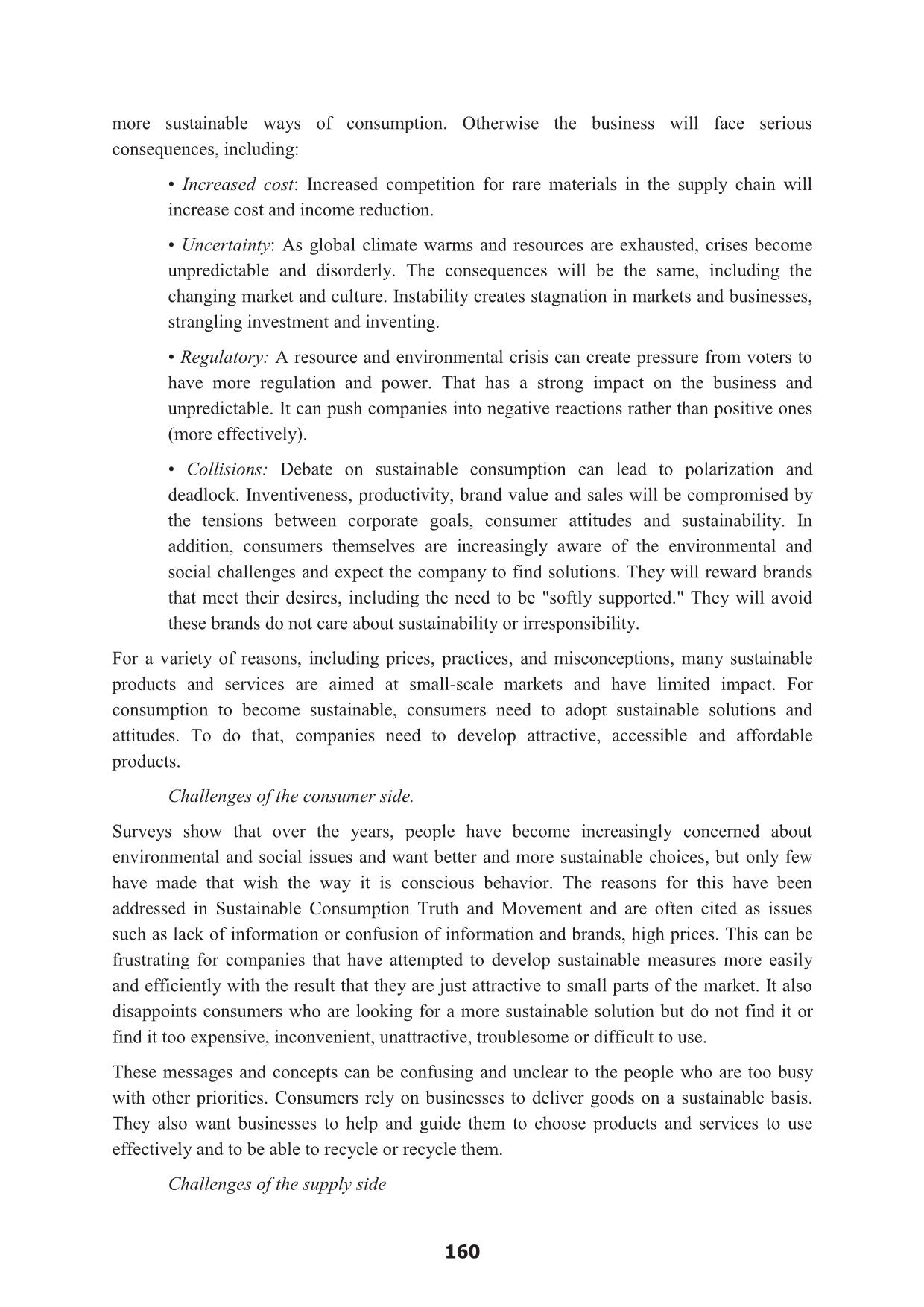
Trang 5
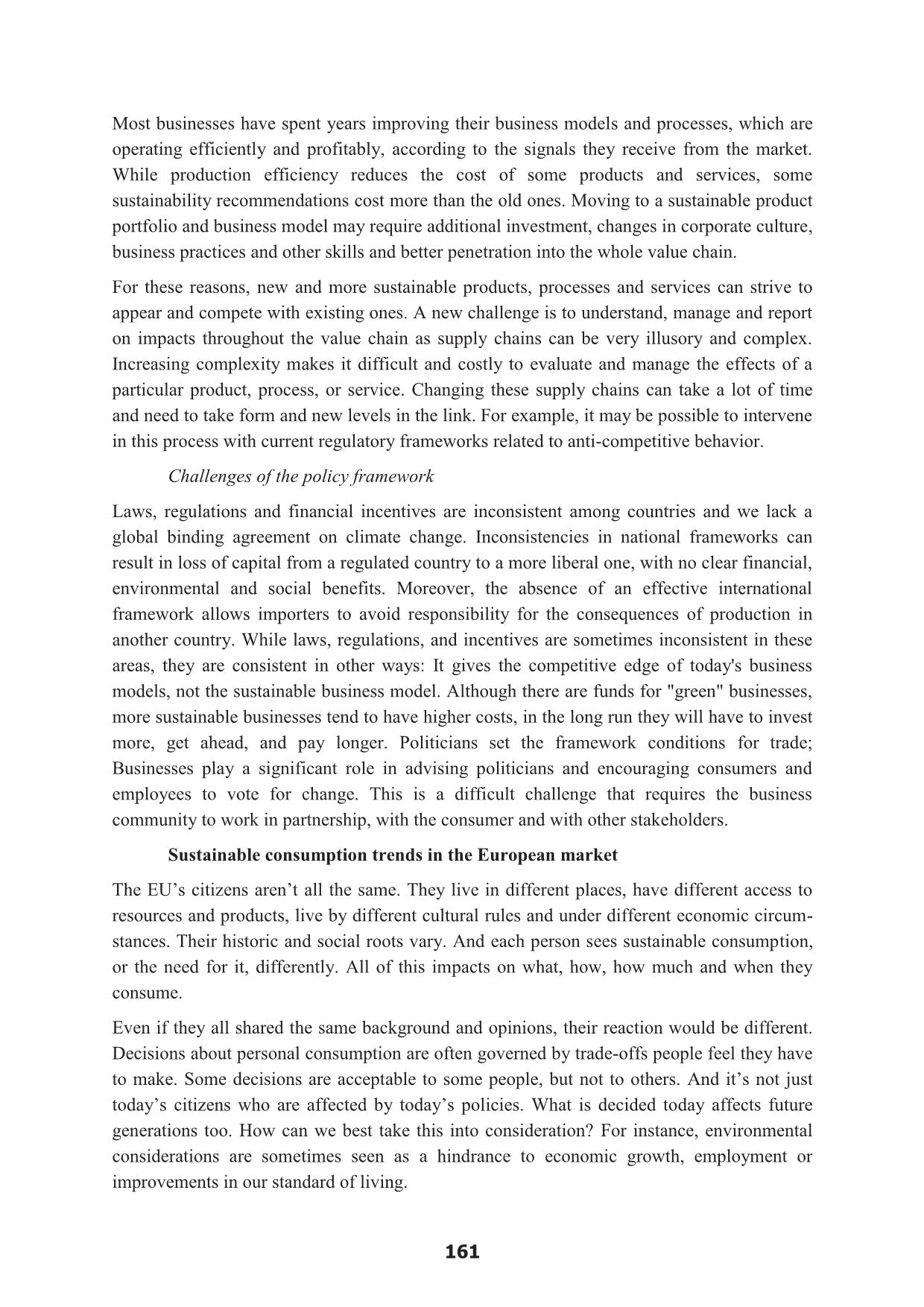
Trang 6
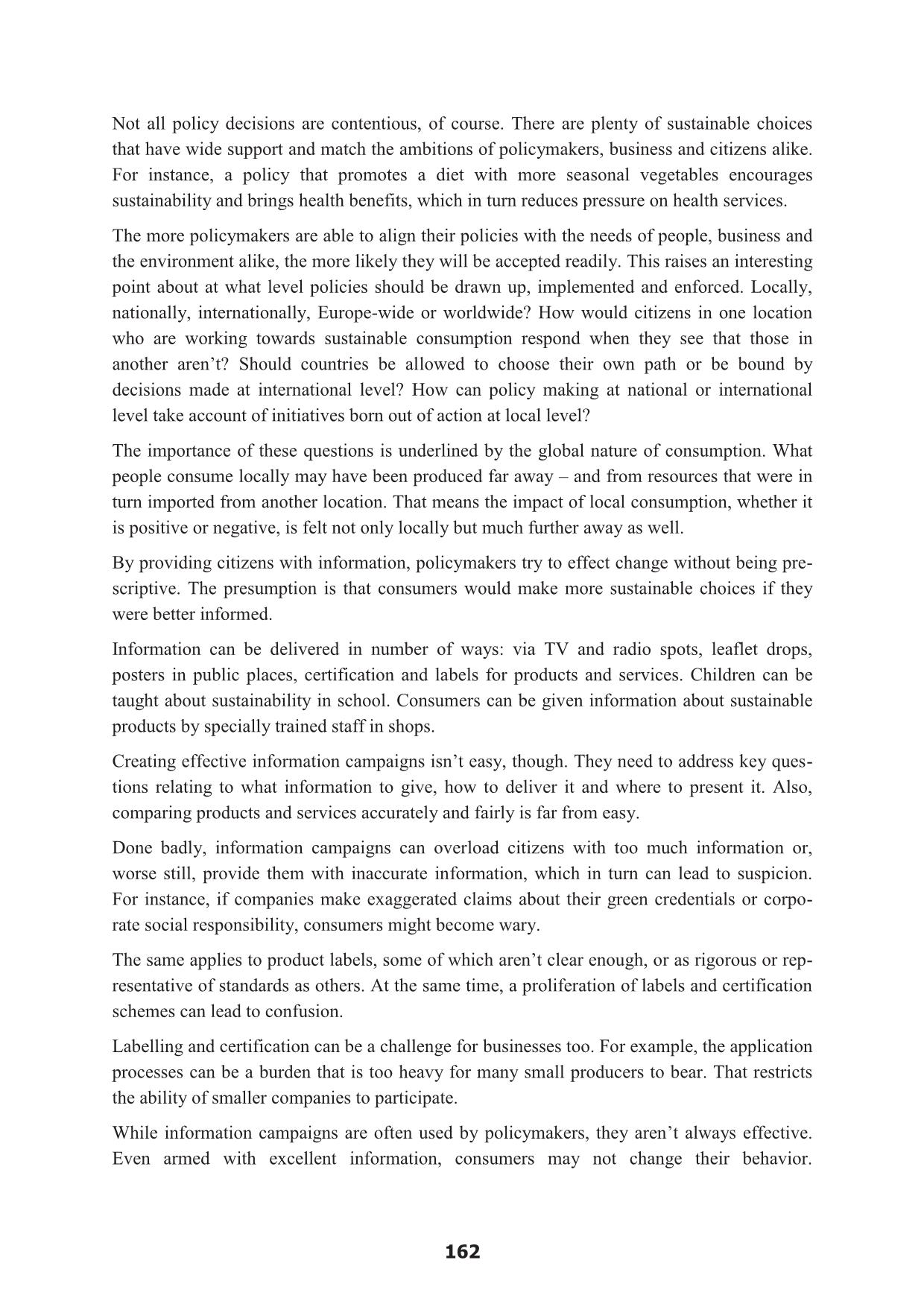
Trang 7
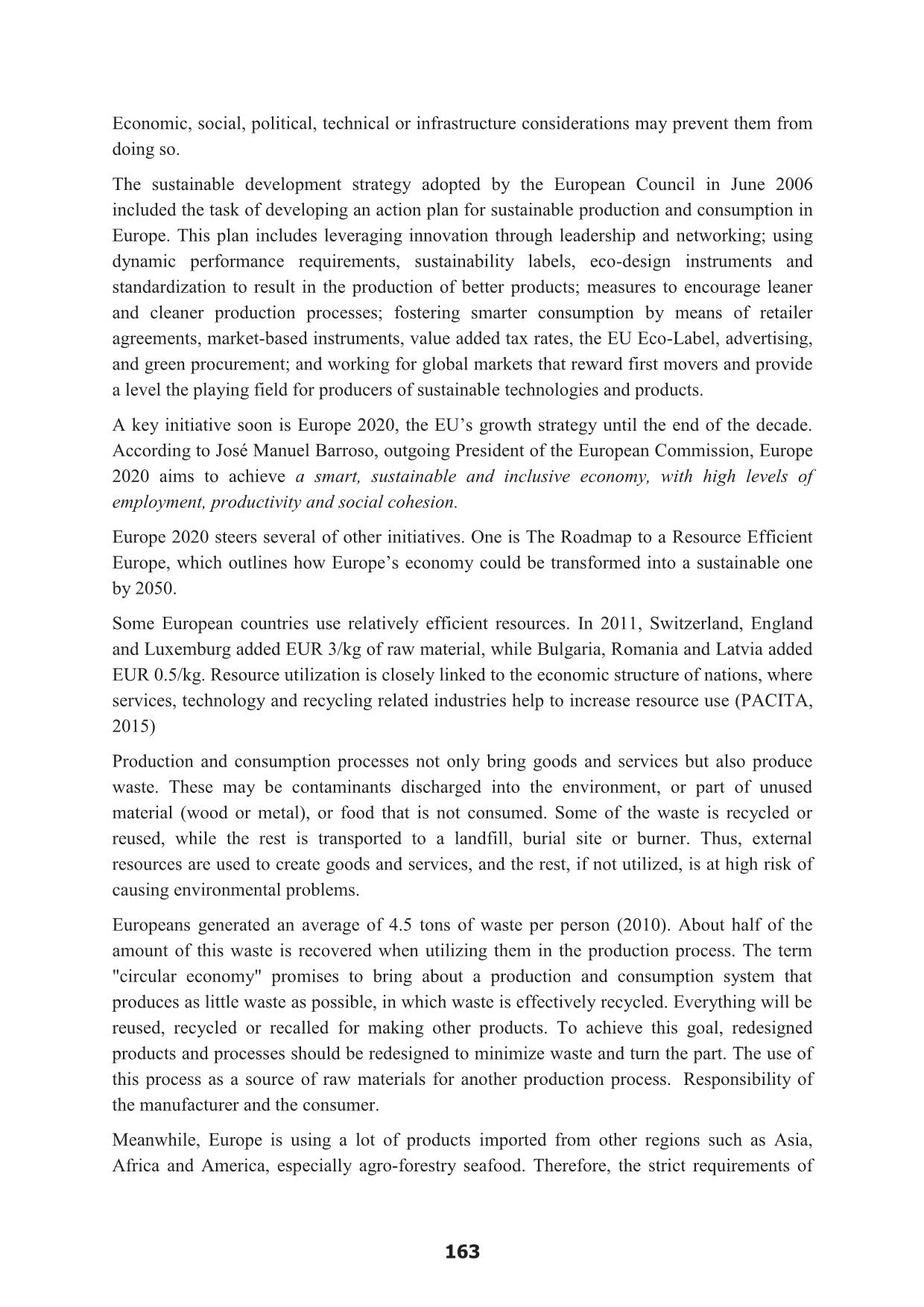
Trang 8
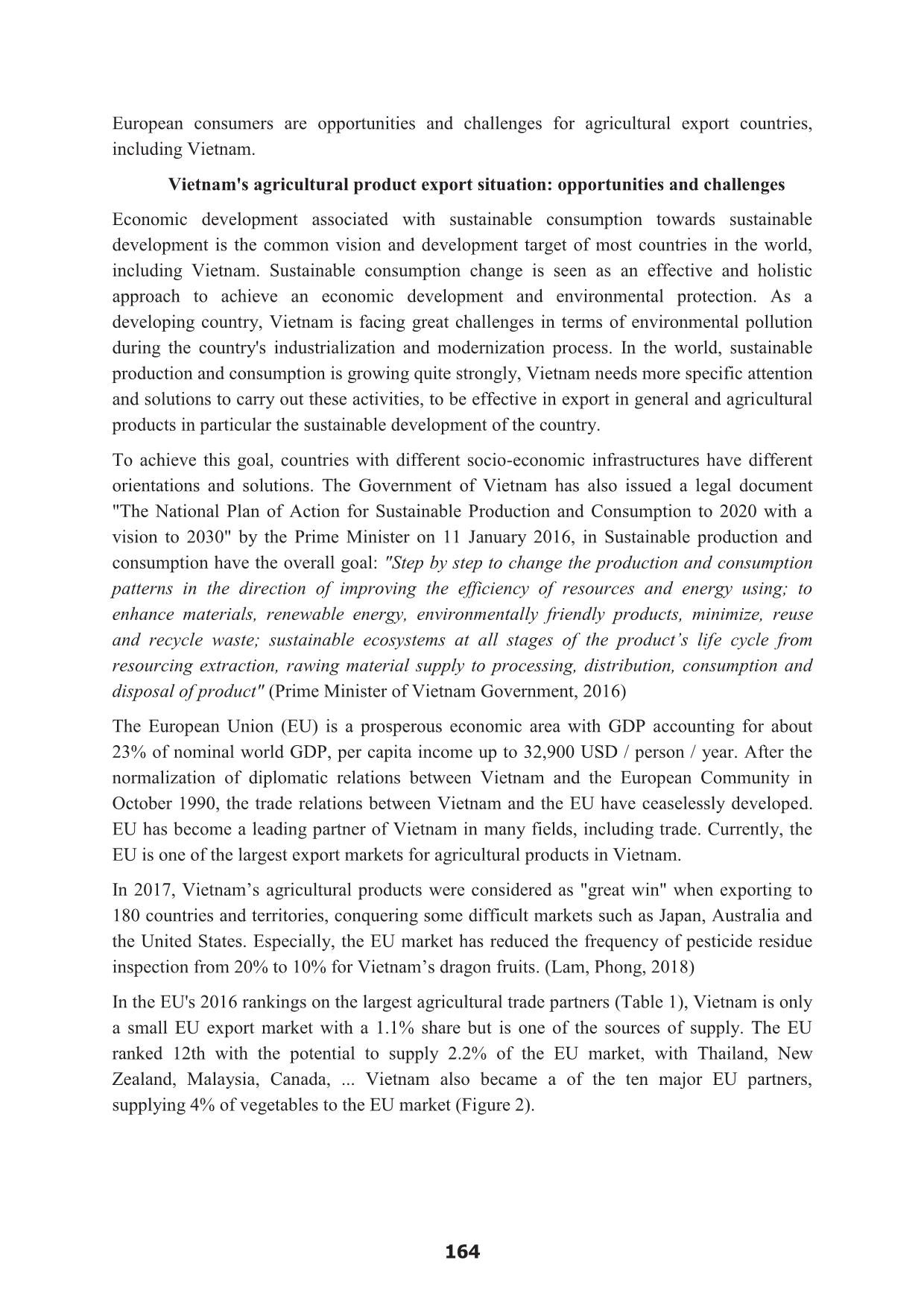
Trang 9
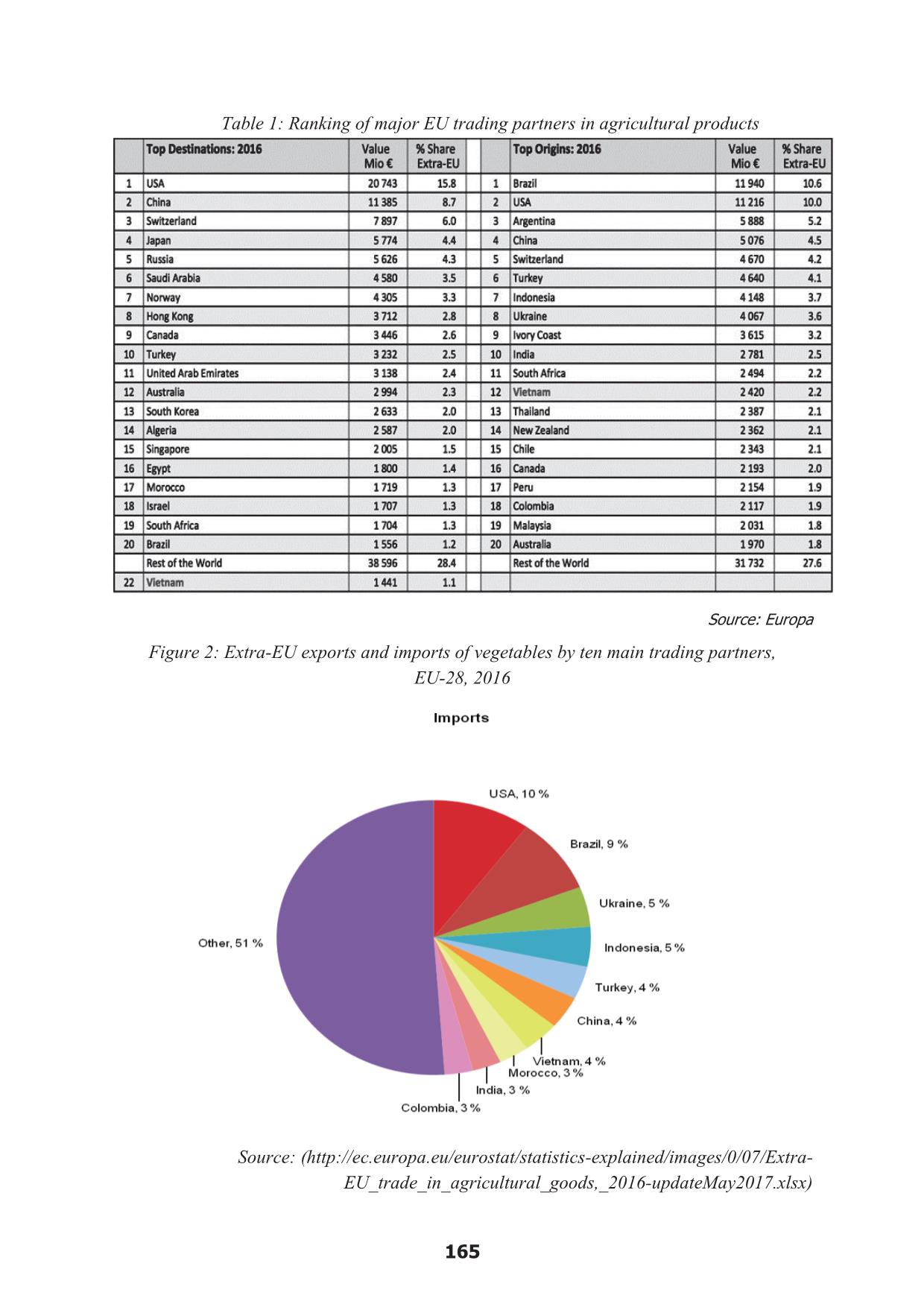
Trang 10
Tải về để xem bản đầy đủ
Tóm tắt nội dung tài liệu: Sustainable comsumption trends in the european market and problems given to Vietnam’s agricultural product exports
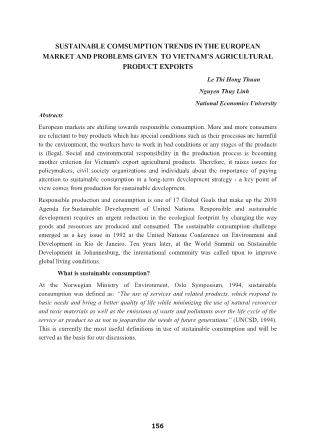
he quality of goods in the country and especially the export of agricultural products to the EU. Regular inspections are necessary because businesses still tend to cut costs, increase profits. Strengthening of quality control should be made from the increase of quarantine inspection facilities for agricultural products; Set up quarantine inspection rooms more suitable, near the agricultural production areas to facilitate the inspection. In addition to quality enhancement, the number of inspections, sampling, and random inspections of manufactured goods is increased. The control at the border checkpoints should be strict and strictly based not only on contracts, but also randomly checking the quality of exports to ensure that they meet the environmental criteria. For wrongful business. In order to do this well, the State needs to invest in physical facilities for the random inspection of samples of export goods right at the border gates and at the same time increase the number of officials in charge of professional training practical understanding of the general environmental criteria and regulations of the EU import market for agricultural products in particular Assist exporters of agricultural products in the inspection and certification of environment. At present, most of Vietnam's standards and environmental certifications are voluntary, so businesses are often overlooked and often ignored. The state needs to put environmental responsibility and social responsibility into the law, and some environmental certifications need to be mandatory so that businesses can be more responsible. The state also needs to invest in infrastructure for environmental verification and certification. The procedures of the national agencies for the accreditation and certification of environmental standards are also affected by the application mechanism and many inadequacies, services of foreign organizations are too costly. Therefore, the state needs to improve the process, simplify procedures and build up a timely and cost-effective portal and information system to support businesses in the application for a license. Raising awareness of enterprises in the implementation of social responsibility and environmental responsibility. Corporate social responsibility is expressed in a number of 170 aspects, such as: 1. Environmental protection; 2. Contribute to the social community; 3. Carrying out the responsibility of the supplier; 4. To ensure the interests and safety of consumers; 5. Good relations with employees; and 6. Ensure benefits to shareholders and employees in the business. In it, the first four elements represent the external responsibility of the business, the last two elements show the internal and internal responsibility of the business. The reality in the world has shown that companies that perform well social responsibility are not only losing their benefits but also increasing. The benefits that businesses gain when carrying out social responsibilities include cost reduction, increased sales, increased brand value, reduced staff turnover, increased productivity, and increased access to new markets. The State should take the initiative in disseminating sustainable production, standards for EU agricultural exports to enterprises. At present, Vietnamese people do not put much emphasis on environmental responsibility, corporate social responsibility or the origin of their products. Therefore, in parallel with equipping enterprises with environmental standards of the EU, it is necessary to educate the general environmental responsibility of the Vietnamese people. The issue of the environment is now a global issue and a problem for every country, so it is also the responsibility of each person. In addition to protecting their own homes, people also need to raise awareness, prioritize the use of clean, environmentally friendly products, firmly oppose and boycott the products, businesses. Production is substandard and does not guarantee environmental and social responsibility. Consumers in the hands to protect the environment will have the greatest impact on businesses to change. The state should also propagandize that businesses are aware of their role in ensuring environmental standards when exporting agricultural products to the EU. International trade is complex and changing frequently. The policies of import markets, competitor markets ... can either negatively affect or bring opportunities for Vietnam's agricultural exports to the EU. As a rule, the EU is only testing the probability of around 10% of the goods entering the market, but in the case of a violation, it will increase to 20% and the EU may issue a full ban on imports that product. Therefore, every business must be responsible for ensuring that EU environmental standards are met when exporting agricultural products so as not to affect themselves and their peers. Continue to strengthen relations with EU Member States. EU factors such as laws, import policies, prices, competition ... and other factors such as inflation, supply and demand factors, tastes, distribution channels, etc. can all influence to adjust the environmental barriers to imported agricultural products. However, Vietnam's exporters have to face many difficulties in research and market access due to geographic distance as well as limited by relationships. Therefore, the Ministry of Industry and Trade should request the EU business deal to strengthen its activities to update information regularly for enterprises about the changes, forecasts and promptly notify changes and additions in the EU's environmental regulations. Along with the strengthening of trade between Vietnam and the EU in terms of politics and economics, Vietnam should actively seek to attract foreign direct investment and agriculture, 171 forestry and fishery products in Vietnam. In addition, the state should actively negotiate on environmental policy to help Vietnamese enterprises to access EU member markets more favorable and active, taking advantage of the support from the project. EU's environment at the export of agricultural products so that Vietnam can better meet the EU's environmental barriers in the future. As the EU market is essentially a coalition and every country have the right to decide on its own, Vietnam must not only reach an agreement with the whole bloc but also create bilateral relations with each member in the block to get more market-specific preferences as well as learn more about the level of demand of environmental barriers of each market. For large and important markets such as Germany, Spain, etc., there is a need for an office of agricultural consultants to promote diplomatic relations and market-related activities in relation to the environment. Solutions for agricultural product associations and exporters: The association plays a very important role in representing the business before the government and in the importing markets. However, most of Vietnam's agricultural associations have not yet shown their role in providing information on laws, markets, business services, trade promotion supports, dispute resolutions ... The issue of human resources and expertise is also the weak point of Vietnamese associations, especially with respect to legal issues in major import markets such as the EU. The majority of people in the association are retired state employees, so they are influenced by the bureaucracy and lack of necessary motivation. Therefore, exporters must take the initiative in contributing and building the organizational structure and staff structure in agricultural associations to ensure their own interests. Associations of commodities related to agricultural products should also have short and long- term strategies in general, active in orienting sectoral development in each market in the EU, organizing more workshops for businesses Agricultural exports to the EU have opportunities to share and exchange learning. For agri-exporters who must overcome the environmental barriers of the EU: businesses need to develop a long-term development strategy with a clear and consistent vision and direction. export market. In fact, when a business does not have a long-term vision, the business will not be able to fully measure the circumstances that will affect the export of its business. Businesses should also regularly update information on EU policies and environmental standards for agricultural products. To do this, businesses need to have their own department and staff in charge, ensuring that the department is well equipped with knowledge, language, and ability to capture, process information and be nimble. In the judgment to have timely suggestions for business. Businesses need to actively seek business partners willing to help businesses overcome environmental barriers and build long-term business relationships. At present, Vietnamese enterprises are mainly exported indirectly, through intermediaries in import markets and due to many subjective and objective reasons, they are quite limited in selecting partners. Being forced to price and not be able to work for a long time, Vietnamese businesses can ask their 172 counterparts in the EU to support themselves in new production and paperwork to better and more fully meet their needs. standards, requirements of the environment. Finding such a partner is not simple and therefore the business should actively contact and coordinate with the relevant government agencies, namely European business to receive support. Agro-exporters need to raise awareness about environmental protection, change the trend toward short-term profitability, and move towards long-term vision. Businesses must thoroughly understand the ideology and equipping all members of the enterprise with respect to environmental issues as well as social responsibility, especially those who work directly in the production process. This must be looked the undefined element to the development of the business, thus making proper investment decisions on facilities for environmental management systems as well applying of international standards, producing oriented industrialization and specialization. In addition, enterprises should be proactive in supply and development of an input supply chain that meets environmental regulations and standards for export agricultural produce: Investing in production technology innovation and actively apply the set of environmental standards required by the EU and accepted; Participating in fairs actively on agricultural products in general and agricultural products imported in the EU in particular; Selecting and training staffs to improve the capacity of export staff to understand the market of agricultural products EU. References: Department of Competition Management, (2006). Handbook of consumer protection. National Political Publisher, Hanoi, p. 33. Hong, Lam (2018). Consumption trends in Europe. Retrieved from: General Statistics Office (2016). Import and export value by country and territory predominantly preliminary months in 2016. Retrieved from: General Statistics Office (2017). Import and export value by country and territory predominantly preliminary months in 2017. Retrieved from: General Statistics Office (2018). Import and export value by country and territory predominantly preliminary months in 2018. Retrieved from: Lam, Phong (2018). Agricultural products of Vietnam "great victory", conquered a series of fastidious market. Retrieved from: PACITA (a EU funded project), (2015). Europe Wide Views on Sustainable Consumption, p.4. (web book–pdf). Retrieved from: PACITA (a EU funded project), (2015). Europe Wide Views on Sustainable Consumption, p.28. (web book–pdf). Retrieved from: 173 Prime Minister of Vietnam, (2012). The master plan for agricultural production development up to 2020 and vision to 2030. Retrieved from: Prime Minister of Vietnam, (2015). The master plan for hi-tech agricultural zones and regions up to 2020 with orientations to 2030. Retrieved from: Prime Minister of Vietnam, (2016). Decision approving the national action program on sustainable production and sustainable conservation till 2020, vision to 2030. Government of Vietnam. Retrieved from: https://thuvienphapluat.vn UN Commission on Sustainable Development (UNCSD), (1994). Symposium on Sustainable Consumption, Oslo. World Wildlife Fund, (2008). Living Planet’ Report. Retrieved from: 174 SUMMARY SUSTAINABLE COMSUMPTION TRENDS IN THE EUROPEAN MARKET AND PROBLEMS REQUIRED FOR VIETNAM’S AGRICULTURAL PRODUCT EXPORTS The European Union (EU) is one of the major export markets for Vietnamese agricultural products and is shifting towards responsible consumption. More and more European consumers are reluctant to buy products whose production processes are harmful to the environment, labors must work in bad conditions, or some stage is illegal. As such, social and environmental responsibility in the production process is becoming a further criterion for Vietnam's export agricultural products. From that point of view, it poses a problem for policy makers, civil society organizations and individuals to understand the need for sustainable consumption in long-term development strategies and solutions that can appropriate to both improve the quality of agricultural products and meet the requirements of European consumers - a key point of departure from the requirements of responsible production for sustainable development. Key words: EU markets, sustainable consumption, agricultural product exports XU HƯỚNG TIÊU DÙNG BỀN VỮNG CỦA THỊ TRƯỜNG EU VÀ VẤN ĐỀ ĐẶT RA VỚI XUẤT KHẨU NÔNG SẢN VIỆT NAM Các nước Liên minh châu Âu (EU) là một trong những thị trường xuất khẩu chủ yếu của nông sản Việt Nam và đang chuyển dịch theo hướng tiêu dùng có trách nhiệm. Ngày càng nhiều người tiêu dùng châu Âu không muốn mua những sản phẩm mà quy trình sản xuất có hại cho môi trường, nhân công phải làm việc trong điều kiện tồi tệ, hoặc có công đoạn nào đó không hợp pháp. Như vậy, trách nhiệm xã hội và môi trường trong quy trình sản xuất đang trở thành một tiêu chí nữa đối với nông sản xuất khẩu của Việt Nam. Từ đó, đặt ra vấn đề cho các nhà hoạch định chính sách, các tổ chức xã hội dân sự và cá nhân hiểu được sự cần thiết quan tâm đến tiêu dùng bền vững trong chiến lược phát triển dài hạn và đưa ra các giải pháp phù hợp để vừa nâng cao chất lượng nông sản vừa đáp ứng được yêu cầu của người tiêu dùng châu Âu – một quan điểm chủ yếu xuất phát từ yêu cầu của sản xuất có trách nhiệm đối với sự phát triển bền vững. Từ khóa: thị trường Châu Âu, tiêu dùng bền vững, xuất khẩu nông sản 175
File đính kèm:
 sustainable_comsumption_trends_in_the_european_market_and_pr.pdf
sustainable_comsumption_trends_in_the_european_market_and_pr.pdf

